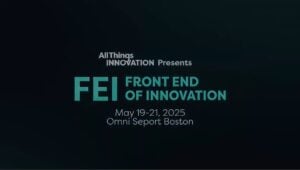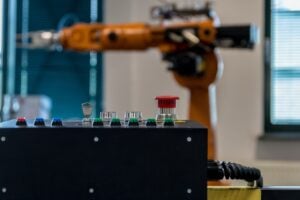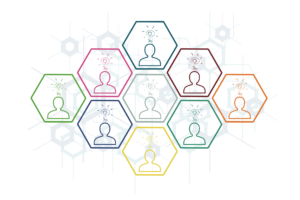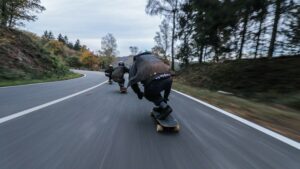The show audience participated in two key innovation roundtables, a variety of general keynote sessions, panels on Gen Z, brunch with several bots from Mass Robotics, off-site experiences and more. A broad range of educational sessions were grouped by the days’ themes, which examined the role of human interactivity in innovation, the growth of artificial intelligence efforts—and the balance of the integral themes of both human-centric and AI-enabled innovation. Day three, meanwhile, looked at the future of innovation with several key trends such as the rise of the Gen Z innovator.
The future of innovation seems limitless but we selected some of the top key takeaways from FEI 2024. We also invite the innovation community to check out our post-show FEI Report, featuring takeaways from every session (to be released soon).
Cultivating A Rogue Mindset
At the outset of FEI 2024, innovators and changemakers alike weighed in on the key themes of the conference, such as the balance of human intelligence combined with AI assistance, and mind versus (or with) machine. Disruption, change and technology was discussed—and how technology will ultimately remain as a way to augment innovation initiatives.
This led to more musings on the innovation journey, and the common threads that hold the community together in the face of change. This includes the escape from the old silo mentality and more emphasis on cross-collaboration and cross-functionality to get the job done. Interdisciplinary interactivity, it seems, is now part of the culture of innovation.
Oh, did we mention going rogue? Certainly, one of the more memorable statements of FEI 2024 was from Tammy Butterworth, Product Innovation Director, Welch’s, about “going rogue.” To be sure, it was a catchy line but one with impact.
Butterworth explained that leaders need to push boundaries. To change the day-to-day culture, one can’t always innovate in a safe space. One must change the culture to a place of curiosity and creativity, find the time and use the tools available to forge innovation.
Will this interdisciplinary approach help close the gap between a problem and its solution and bring about innovation faster? Creating a leadership culture plays in part to having a rogue mindset. Cultivating that mindset is not without risk or failure. But it helps to manage that risk. To be sure, Butterworth reminded the audience, one must still implement innovation initiatives and align with company objectives and strategies. But to change the culture—sometimes, you must go rogue.
Minds With Machines
A fair number of keynote presentations as well as educational sessions focused on human intelligence and interactivity, the role of AI, and the balance between the two. With the growth of AI initiatives, this also led to much discussion about the renewal of the data-innovation journey. Data science, analytics, and insights are playing a key role in innovation today. With everything at a faster pace in the corporate enterprise, innovators are tasked with developing faster both in the short- and long-term. Taking that data-driven approach helps minimize risk and helps innovators place their bets, both small and large, into more winning initiatives that help the business—today and tomorrow.
Speeding the proposition in a decentralized environment, building an innovation community, takes a lot of collective human intelligence, as well as interdisciplinary activity. Strategies must evolve. Failing faster becomes more of a requirement, as is continuous learnings from those failures.
Humans remain at the center of this process, since after all much of innovative solutions have to do with solving very human problems, many innovators agreed, yet AI can augment these efforts.
In one such session on AI and the role of prompt engineering, Donald High, Chief Data Scientist at Internal Revenue Service, seemed to put it succinctly—that it’s really about the best of both worlds. It’s a combination of human ingenuity, creativity and ideation with AI as an accelerator, says High. “Combine the two—that’s the future,” says High. “That’s collective intelligence.”
The process of “mind with machine,” however, may still be a way off, though. While AI may be changing everything, as Kate Carruthers, Head BI, UNSW AI Institute, Chief Data & Insights Officer at University of New South Wales, suggested, we are still in a position of transformational change. “We are still in the early adoption curve,” says Carruthers. “AI is still in the ‘Netscape’ year.” The evolution and implications are still developing. But Carruthers also notes that true collective intelligence may inevitably be human and machine.
Innovation as a Team Sport
With all the diverse discussions at FEI 2024 about human interdisciplinary interactivity and the usefulness yet cautious optimism regarding AI, now what? Where does innovation go from here and into the glorious, perhaps tech-driven future?
In one of the closing keynote sessions, in a day filled with innovative robotics and even more innovative Gen Z entrepreneurs, Katharine English, Head of Innovation Programs, Engineering Excellence at Google, helped ground the discussion. Her fireside chat, “Innovation As A Team Sport,” focused on establishing a winning mindset to actually (and finally) achieve a culture of innovation.
Be a champion of change, yet don’t necessarily take an ownership mindset, says English. “Everyone has to own it as a collective,” she says.
The innovation journey also needs a process. One needs a process mindset regardless of the company, lab or institution one is working within. But in this time of change, democratize that process, English says.
Remember that innovation is indeed a team sport, says English. You can’t do it all alone. To make innovation happen, find that place of psychological safety, she advises. Build with the expectation to fail—and don’t be afraid to fail. Embrace it as part of learning. It may be messy at times, but the process mindset puts some governance on the journey. Sustain that innovation by making it transactional and actionable, she says.
In the end, it’s perhaps that journey of continuous learning that can support the innovator in their efforts in this ever-accelerating world.
“Break the rules,” says English. “Push boundaries.” Which is not unlike, perhaps, having a rogue mindset, after all.
Editor’s Note: FEI 2025 will be held May 19-21, 2025, at the Omni Boston at the Seaport, Boston, MA.
Contributor
-

Matthew Kramer is the Digital Editor for All Things Insights & All Things Innovation. He has over 20 years of experience working in publishing and media companies, on a variety of business-to-business publications, websites and trade shows.
View all posts





































































































































































































































































